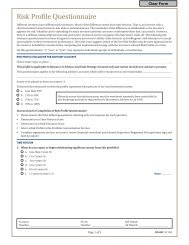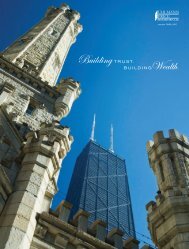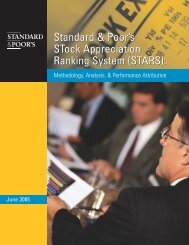The Inflation Cycle of 2002 to 2015 - Uhlmann Price Securities
The Inflation Cycle of 2002 to 2015 - Uhlmann Price Securities
The Inflation Cycle of 2002 to 2015 - Uhlmann Price Securities
Create successful ePaper yourself
Turn your PDF publications into a flip-book with our unique Google optimized e-Paper software.
Industrial Portfolio Strategy<br />
<strong>The</strong> <strong>Inflation</strong> <strong>Cycle</strong> <strong>of</strong> <strong>2002</strong> <strong>to</strong> <strong>2015</strong> ⎯ April 19, <strong>2002</strong> -72- Legg Mason Wood Walker, Inc.<br />
Saudi National Guard since 1963. Prince Abdullah is generally regarded as having a more fundamentalist<br />
approach <strong>to</strong> Islam than Fahd, and is reputed <strong>to</strong> be a strong-willed reformer and a pragmatist.<br />
Royal succession could cause political turmoil in Saudi Arabia. Though Prince Abdullah is reportedly<br />
healthy, at age 78, royal succession is still an open question vis-à-vis other members <strong>of</strong> the Sudairi Seven,<br />
their descendants, or other members <strong>of</strong> the royal family. We note that there is a strong relationship between<br />
Abdullah and Saudi Minister <strong>of</strong> Foreign Affairs Saud al-Faisal, the latter being the son <strong>of</strong> former Saudi<br />
King Faisal, and it is possible that Saud al-Faisal could emerge as the next Saudi Crown prince upon King<br />
Fahd’s passing, in our view. <strong>The</strong> lack <strong>of</strong> clarity with regard <strong>to</strong> succession is not a major deviation from the<br />
political his<strong>to</strong>ry <strong>of</strong> Saudi Arabia. Although Saudi Arabia has established a number <strong>of</strong> consultative or democratic<br />
institutions, <strong>to</strong> include the Majlis al Shuria (Consultative Council) that was revived by King Fahd after<br />
the Gulf War, our view is that for the success <strong>of</strong> the al-Saud monarchy, the next Saudi King must<br />
be a reformer and have more national prosperity via higher oil prices.<br />
In our view, the power structure that has evolved in Saudi Arabia is a triumvirate, and its continued<br />
stability is <strong>of</strong> global interest <strong>to</strong> avoid major war and commodity and consumer inflation. In one corner <strong>of</strong> the<br />
Saudi triumvirate, there is the secular political authority <strong>of</strong> the al-Saud monarchy. <strong>The</strong> Saud family derives<br />
inspiration and occasional force from the Islamic religious authorities, who occupy the opposite corner,<br />
some <strong>of</strong> whom are the descendants <strong>of</strong> Abdul Wahhab, and are known as the al-Sheiks. Both parties derive<br />
earthly sustenance from the region’s economic interests - mainly related <strong>to</strong> oil in the modern era – which<br />
occupies the third corner. We believe that oil price deflation since the early 1980s has destabilized the economic<br />
interests <strong>of</strong> the region, since the his<strong>to</strong>ry <strong>of</strong> the Saudi monarchy has been <strong>to</strong> use financial largesse <strong>to</strong><br />
“buy <strong>of</strong>f” discontent. We believe that this economic pressure has created a situation in which some <strong>of</strong> the<br />
long-simmering religious authorities have used the economic malaise <strong>to</strong> blame the political authorities for<br />
economic failure and its consequences, potentially in a bid for power and increased religious governance.<br />
<strong>The</strong> rapid urbanization and collapse <strong>of</strong> per capita GNP in Saudi Arabia, shown in Exhibit 56, has left<br />
the country with a rising cadre <strong>of</strong> disaffected young men, in our view. <strong>The</strong> situation is aggravated by a<br />
birth rate that is among the highest in the world, and a surge from 2000 <strong>to</strong> <strong>2015</strong> <strong>of</strong> potentially disenfranchised<br />
young Saudis relative <strong>to</strong> older, more established, and presumably less fiery Saudis, depicted in Exhibit<br />
57. Unless the oil-based economy <strong>of</strong> Saudi Arabia receives a boost, and parlays that wealth in<strong>to</strong> a successful<br />
diversification effort, we believe this youth explosion will collide with a dearth <strong>of</strong> private industry<br />
job opportunities, pushing the existing unemployment rate <strong>of</strong> approximately 25% even higher. In fact, youth<br />
explosion is a pan-Gulf problem. Among the Gulf states, ex-Iran and Iraq, non-citizens make up 37% <strong>of</strong> the<br />
population <strong>of</strong> 32.4 million, and residents under age 15 make up 40% <strong>of</strong> the population. In Saudi Arabia in<br />
particular, where the economy has failed <strong>to</strong> diversify beyond oil, in our view, this raises the prospect that<br />
more people will fall under the spell <strong>of</strong> the radical elements.<br />
With approximately 5,000 Saudi princes, the odds <strong>of</strong> at least several hundred “black sheep” are quite<br />
high, in our view. Those “bad apples” fuel resentment and may give the approximately 100 ruling princes a<br />
bad name, so we believe that current discussions regarding a culling <strong>of</strong> the royal roster may gain momentum,<br />
especially since high birth rates make royal expansion an increasingly serious problem.<br />
As a result, Saudi capital flight and corruption are serious issues, the result <strong>of</strong> some members <strong>of</strong> the<br />
royal family and high-level technocrats protecting their self-interest in a period <strong>of</strong> economic pressure. <strong>The</strong>re








